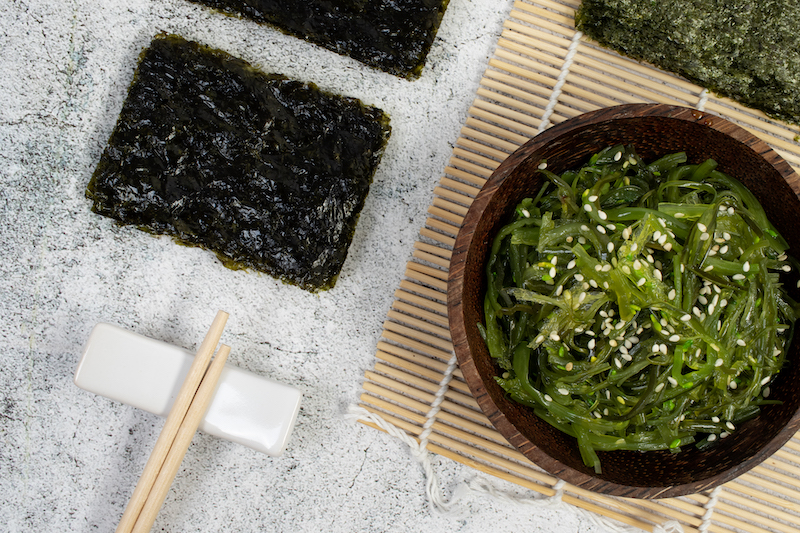In an age where health and wellness are increasingly prioritized, the treasures of the ocean are emerging as surprising allies. Seaweeds, these often overlooked marine plants, are taking the nutritional and health care worlds by storm. Their abundance in essential nutrients positions them at the forefront of superfoods, offering an impressive range of benefits, from disease prevention to stress management. How can you incorporate them into your diet? What are their actual benefits? Let’s explore.
It may come as a surprise to many, but yes, seaweeds are edible and not just in sushi roll! As snacks or in various dishes, these marine foods prove to be highly beneficial for health.
What Are Seaweeds?
Seaweeds are aquatic organisms that thrive in a range of environments including oceans, lakes, and rivers. They come in various shapes and sizes, from single-celled microalgae to multicellular macroalgae, such as brown, red, and green seaweeds. This diversity results in a wide array of nutritional profiles, but all seaweeds share a common trait: they are rich in essential nutrients.
The rising interest in seaweeds within the nutrition field is due to their status as a valuable source of proteins, vitamins, minerals, and antioxidants. Moreover, they are a natural source of dietary fiber, rendering them excellent for digestion and weight management.
Hidden Nutritional Treasures
Seaweeds are beneficial for health due to their near-perfect composition. Here’s a snapshot of the key nutrients found in seaweeds:
- Proteins: Seaweeds serve as an outstanding plant-based source of high-quality proteins. They contain all the essential amino acids vital for building and repairing body tissues.
- Vitamins: Seaweeds are abundant in vitamins, notably vitamin A (as beta-carotene), vitamin C, vitamin K, and various B vitamins. These vitamins play crucial roles in maintaining overall health.
- Minerals: Seaweeds provide a rich supply of essential minerals including calcium, magnesium, iron, and iodine. Iodine, in particular, is vital for proper thyroid function.
- Antioxidants: With their high antioxidant content, seaweeds help combat free radicals and reduce oxidative stress, thus contributing to disease prevention.
- Fiber: The fiber found in seaweeds promotes healthy digestion, regulates blood sugar levels, and aids in maintaining a healthy body weight.
What Are the Benefits of Seaweeds?
For a healthier life, seaweeds might be your best ally. Indeed, these marine foods offer more than just a few advantages!
Disease Prevention
Seaweeds are recognized for their ability to lower the risk of cardiovascular diseases, type 2 diabetes, and certain types of cancer, largely thanks to their antioxidant and fiber content.
Stress and Fatigue Management
Rich in nutrients that support the nervous system, seaweeds contribute to managing stress and fatigue, proving useful during high-pressure moments, such as at work.
Weight Regulation
Due to their high fiber content and low-calorie nature, seaweeds can help control appetite and maintain a healthy body weight.
Thyroid Health Support
The iodine found in seaweeds is essential for proper thyroid function, which can help regulate metabolism and maintain consistent energy levels.
How to Eat Seaweeds?
Seaweeds are versatile in the kitchen and can be incorporated in various ways. Here are some ideas to include seaweeds in your daily meals:
- Salads: Dried seaweeds can be crumbled and added to salads for a crunchy, salty kick. These same dried seaweeds can also be enjoyed on their own as a snack.
- Sushi: Widely recognized, nori seaweed sheets are commonly used to wrap rice and vegetables in sushi.
- Smoothies: Seaweed powder can be blended into smoothies for an extra nutrient boost.
- Soups: Wakame or kombu seaweeds are excellent for enhancing the flavor of soups and broths.
Seaweeds are no longer a well-kept secret. Their health benefits and culinary versatility make them valuable foods for anyone aiming to lead a healthy, balanced life. Feel free to experiment with healthy seaweed-based recipes and discover all the advantages they have to offer. The treasures of the ocean are waiting for you!
NOTE
Some seaweeds, like the brown ones, can absorb and store minerals from seawater, making them incredibly rich in nutrients. For instance, kelp, a type of brown seaweed, can contain up to 30 times more iron than spinach!







